Unit 8 Have you read Treasure Island yet? 现在完成时(一)(共28张PPT)
文档属性
| 名称 | Unit 8 Have you read Treasure Island yet? 现在完成时(一)(共28张PPT) |
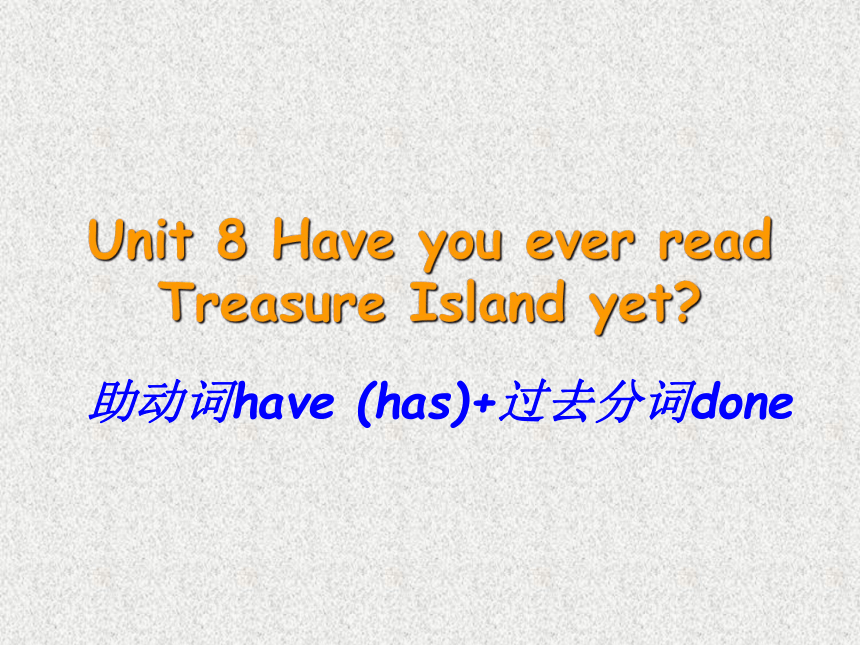
|
|
| 格式 | zip | ||
| 文件大小 | 456.5KB | ||
| 资源类型 | 教案 | ||
| 版本资源 | 人教新目标(Go for it)版 | ||
| 科目 | 英语 | ||
| 更新时间 | 2019-05-24 00:00:00 | ||
图片预览

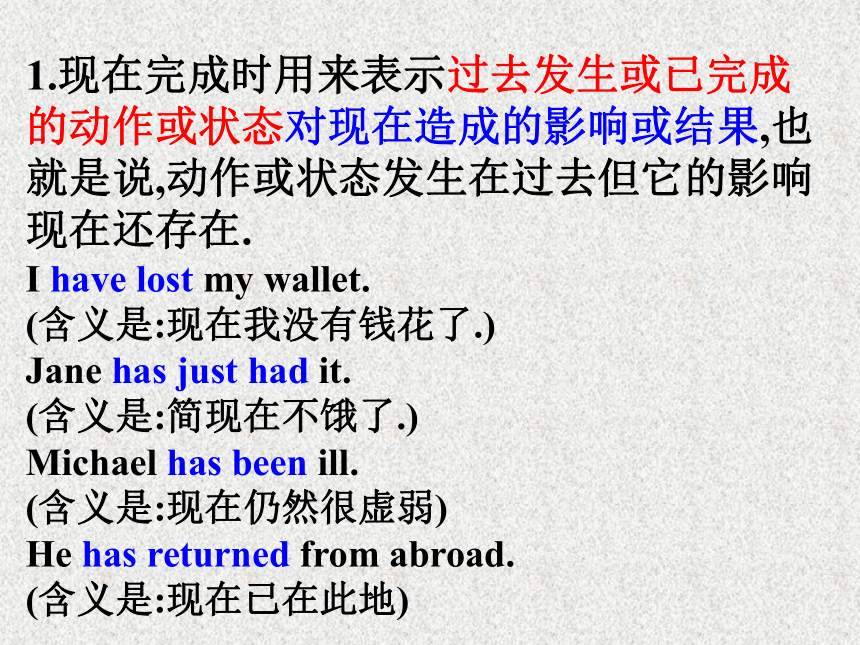
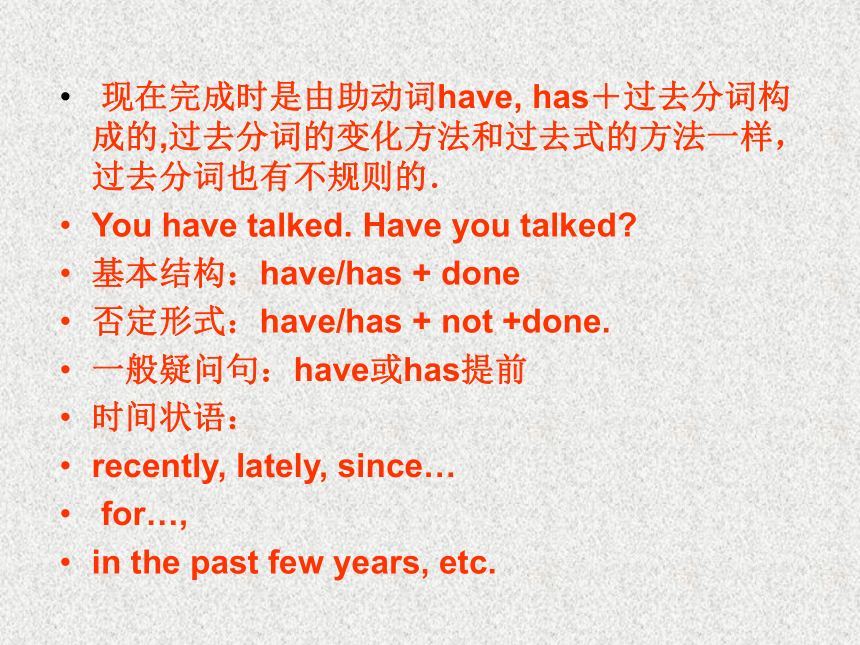
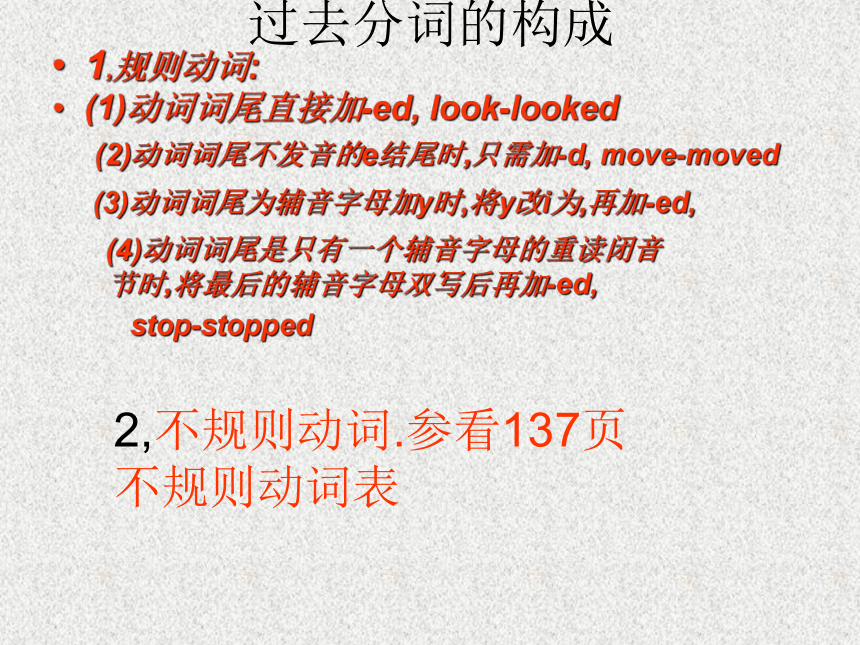
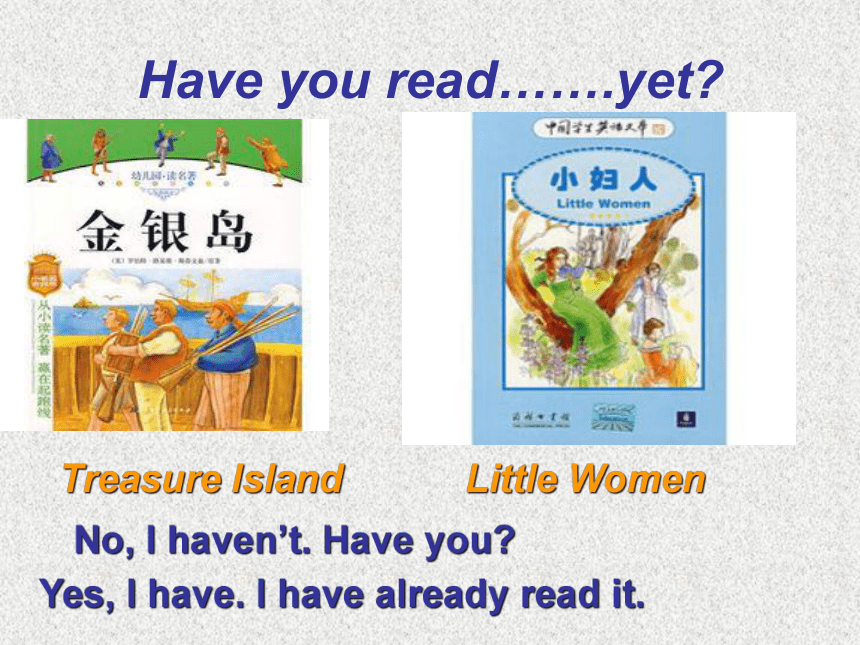
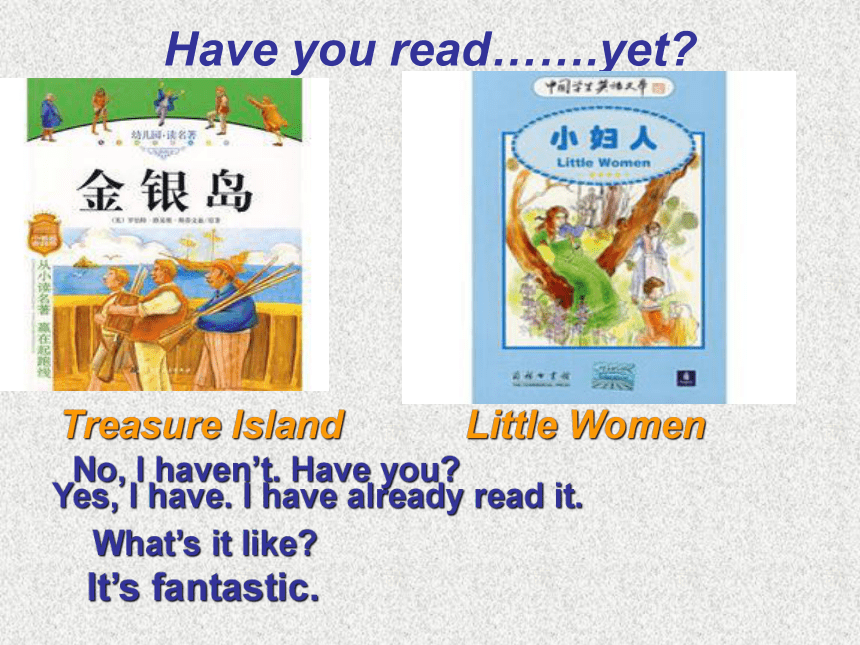
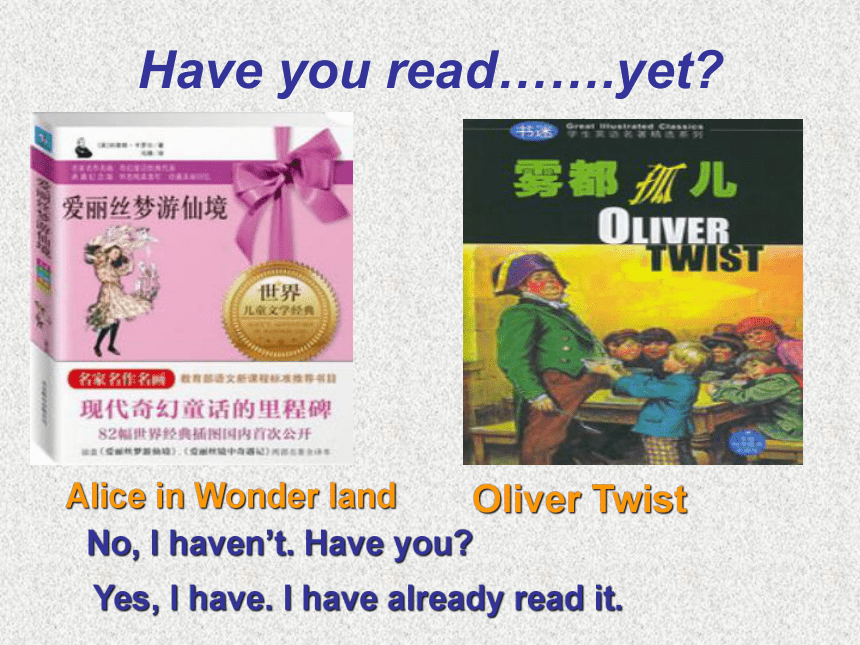
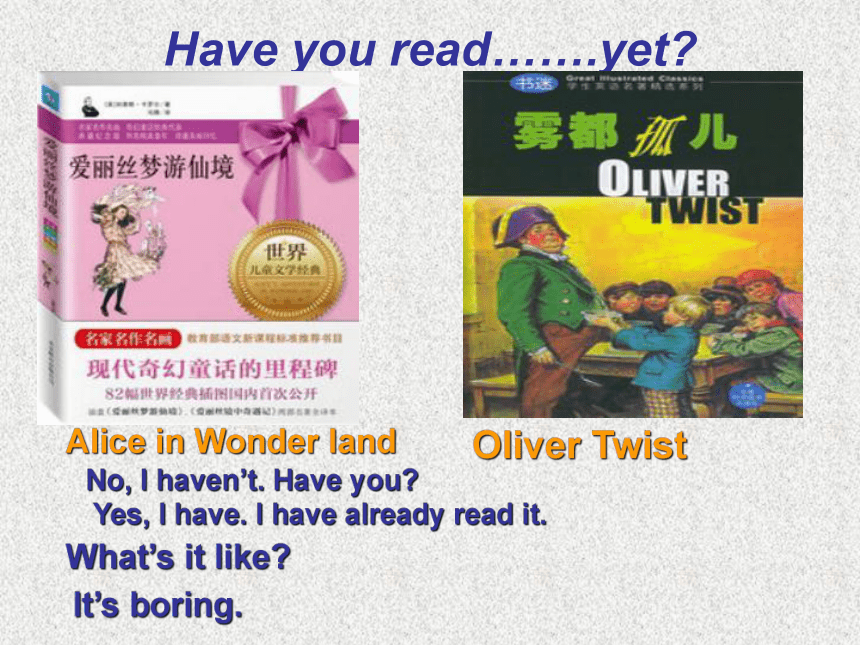
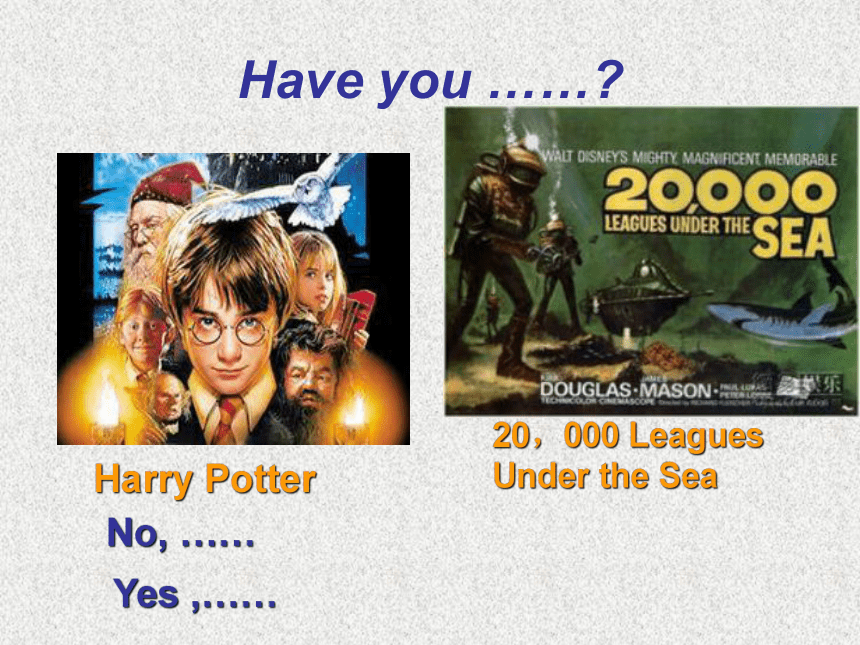
文档简介
Unit 8 Have you ever read Treasure Island yet?
助动词have (has)+过去分词done
1.现在完成时用来表示过去发生或已完成的动作或状态对现在造成的影响或结果,也就是说,动作或状态发生在过去但它的影响现在还存在.
I have lost my wallet.
(含义是:现在我没有钱花了.)
Jane has just had it.
(含义是:简现在不饿了.)
Michael has been ill.
(含义是:现在仍然很虚弱)
He has returned from abroad.
(含义是:现在已在此地)
现在完成时是由助动词have, has+过去分词构成的,过去分词的变化方法和过去式的方法一样,过去分词也有不规则的.
You have talked. Have you talked?
基本结构:have/has + done
否定形式:have/has + not +done.
一般疑问句:have或has提前
时间状语:
recently, lately, since…
for…,
in the past few years, etc.
过去分词的构成
1,规则动词:
(1)动词词尾直接加-ed, look-looked
(2)动词词尾不发音的e结尾时,只需加-d, move-moved
(3)动词词尾为辅音字母加y时,将y改i为,再加-ed,
(4)动词词尾是只有一个辅音字母的重读闭音节时,将最后的辅音字母双写后再加-ed,
stop-stopped
2,不规则动词.参看137页 不规则动词表
Have you read…….yet?
Treasure Island
Little Women
Yes, I have. I have already read it.
No, I haven’t. Have you?
Have you read…….yet?
Treasure Island
Little Women
Yes, I have. I have already read it.
No, I haven’t. Have you?
What’s it like?
It’s fantastic.
Have you read…….yet?
Alice in Wonder land
Oliver Twist
No, I haven’t. Have you?
Yes, I have. I have already read it.
Have you read…….yet?
Alice in Wonder land
Oliver Twist
No, I haven’t. Have you?
Yes, I have. I have already read it.
What’s it like?
It’s boring.
Have you ……?
20,000 Leagues Under the Sea
Harry Potter
No, ……
Yes ,……
Have you ……?
20000 Leagues Under the Sea
Harry Potter
No, ……
Yes ,……
What’s …….
It’s …..
Have you ……?
Robinson Crusoe
Tom Sawyer
No, ……
Yes ,……
Have you ……?
Robinson Crusoe
Tom Sawyer
No, ……
Yes ,……
What’s……
It’s …….
?Life and Strange Surprising Adventures of Robinson
Have you ……?
No, ……
Yes ,……
What’s……
It’s …….
What’s it about?
It’s about a man called Robinson and his life on an island.
Have you …….?
No,……
Yes,……
What’s it like ?
It’s …..
What’s it about?
It’s about a boy called Jim who goes out to sea and finds an island full of treasures.
1.充满了…….2.满是……..的
Have you …….?
No,……
Yes,……
What’s it like ?
It’s …..
What’s it about?
It’s about four sisters growing up.
1.成长? 2.逐渐形成
Have you …….?
No,……
Yes,……
What’s it like ?
It’s …..
What’s it about?
It’s about a boy called Tom Sawyer who lives in the united states. Many exciting things happen to him.
sth. happen to sb. 某事发生在某人身上
总结现在完成时:
1、构成:have / has +过去分词。
2、概念:
(1)表示过去或已经完成的某一动作对现在 成的影响或结果。常与下列状语连用:already, just, yet, ever, never, before
(2)表示过去已经发生,持续到现在的动作或状态,可以和表示从过去某一时刻延续到现在(包括“现在”在内)的一段时间的状语连用。
a.for和表示一段时间的词组连用。
如:for 3 years
b.since和表示过去某一时刻的词或词组连用。
如:since 1997, since two years ago,since last week
比较现在完成时和过去时的区别:
*现在完成时所表示的是过去的发生的动作对现在造成的影响和结果,强调的是现在的情况,所以不能和表示过去的时间状语连用,如:yesterday,last night, three weeks ago, in 1990。
*一般过去时表示的是过去发生的动作或状态,和现在不发生联系,它可以和表示过去的时间状语连用。
I have seen the film.(我了解这部电影的内容。)
I saw the film last week.(只说明上星期看了这部电影,不涉及现在的情况。)
1. My father bought many books for me yesterday .
Now , I have a lot to read because ________________________________
2. I saw this film last week.
Now, I know this film because I_____________________.
3. I did my homework yesterday.
Now, I can give it to the teacher because I______________
my father has bought many books for me.
have seen it before
have done it.
“仍然,还 ” 用在疑问句和否定句中,放在句末。
I haven’t read this book yet .
Have you had breakfast yet ?
already:
Yet:
“已经”通常用于肯定句中,放在句中。
I have already read this book.
有时,也用在疑问句中表示惊讶。
Have you eaten up all the food already ?
“从来不” 用在否定句中,放在句中。
Is he famous ?I have never heard of him .
ever
never
“曾经”通常用于疑问句和肯定句中,放在句中。
I have ever seen this film.
Have you ever been to the USA ?
She began to work in 2016.
She still works here now.
She has worked at this school for 3 years.
now
past
I began to teach
English at this
school five
years ago.
I have taught
English at this
school for five years.
用法2:
过去发生的动作一直延续到现在。
1. I am a doctor. I began to work when I was 22.Now , I am 26. I ________ for four years.
2. We went to the USA last Monday. Today is Monday . We _________ (stay) in the USA since last Monday.
have worked
have stayed
since and for
The woman has worked at this school for 2 years.( since two years ago)
since 2 years ago
since 1998
since she came to the school)
for + 时间段
since+时间点
for 2 years/a long time
Fill in the blanks
When I first arrived on this____, I had ______ But I found the ship and made a small boat . I’ve brought back many things I can____—food and drink,____, knives and____. Although I have lost_______, I have not____ my life. So I will not give up and I will _______ another ship. I have _______cut down trees and ____ a house. I go out _____ my gun almost every day to kill animals and birds for ____. I’m even learning to grow fruit and vegetables.
already; nothing; wait for ; tools; use ; built ; guns; food; everything; lost; island; with;
island
nothing.
.
tools
guns
everything
lost
wait for
already
built
with
food
use
带回
已经失去了
放弃
我甚至在学习
A few weeks ago, I found the marks of another____ feet on the sand. Who ____is on my island? How long ____they been here? Not long after that, I saw some cannibals _____to ____two man from a broken ship. One of them died but the _____ran towards my house. I _____him kill the cannibals. This ___ now lives with me and_____ me. I named him Friday because that was the___ I met him. He is smart and I have ______taught him some_______.
man’s, else, have, kill, trying, man,
other, helped,
helps, day, already, English.
man’s
else
have
trying
other
helped
helps
day
already
English.
kill
man
记号,痕迹
沙滩,沙子
那之后不久
食人肉者
破船
跑向……
为… 起名
Answer the questions.
1. What this passage about?
It’s about a man called Robinson and his life on an island.
2. Did Robinson have anything when he first arrived on the island?
No ,he didn’t.
3.Who did robinson try to kill?
Some cannibals.
4.Have Friday learned English before?
No. he haven’t.
5.Who taught Friday English?
Robinson did.
助动词have (has)+过去分词done
1.现在完成时用来表示过去发生或已完成的动作或状态对现在造成的影响或结果,也就是说,动作或状态发生在过去但它的影响现在还存在.
I have lost my wallet.
(含义是:现在我没有钱花了.)
Jane has just had it.
(含义是:简现在不饿了.)
Michael has been ill.
(含义是:现在仍然很虚弱)
He has returned from abroad.
(含义是:现在已在此地)
现在完成时是由助动词have, has+过去分词构成的,过去分词的变化方法和过去式的方法一样,过去分词也有不规则的.
You have talked. Have you talked?
基本结构:have/has + done
否定形式:have/has + not +done.
一般疑问句:have或has提前
时间状语:
recently, lately, since…
for…,
in the past few years, etc.
过去分词的构成
1,规则动词:
(1)动词词尾直接加-ed, look-looked
(2)动词词尾不发音的e结尾时,只需加-d, move-moved
(3)动词词尾为辅音字母加y时,将y改i为,再加-ed,
(4)动词词尾是只有一个辅音字母的重读闭音节时,将最后的辅音字母双写后再加-ed,
stop-stopped
2,不规则动词.参看137页 不规则动词表
Have you read…….yet?
Treasure Island
Little Women
Yes, I have. I have already read it.
No, I haven’t. Have you?
Have you read…….yet?
Treasure Island
Little Women
Yes, I have. I have already read it.
No, I haven’t. Have you?
What’s it like?
It’s fantastic.
Have you read…….yet?
Alice in Wonder land
Oliver Twist
No, I haven’t. Have you?
Yes, I have. I have already read it.
Have you read…….yet?
Alice in Wonder land
Oliver Twist
No, I haven’t. Have you?
Yes, I have. I have already read it.
What’s it like?
It’s boring.
Have you ……?
20,000 Leagues Under the Sea
Harry Potter
No, ……
Yes ,……
Have you ……?
20000 Leagues Under the Sea
Harry Potter
No, ……
Yes ,……
What’s …….
It’s …..
Have you ……?
Robinson Crusoe
Tom Sawyer
No, ……
Yes ,……
Have you ……?
Robinson Crusoe
Tom Sawyer
No, ……
Yes ,……
What’s……
It’s …….
?Life and Strange Surprising Adventures of Robinson
Have you ……?
No, ……
Yes ,……
What’s……
It’s …….
What’s it about?
It’s about a man called Robinson and his life on an island.
Have you …….?
No,……
Yes,……
What’s it like ?
It’s …..
What’s it about?
It’s about a boy called Jim who goes out to sea and finds an island full of treasures.
1.充满了…….2.满是……..的
Have you …….?
No,……
Yes,……
What’s it like ?
It’s …..
What’s it about?
It’s about four sisters growing up.
1.成长? 2.逐渐形成
Have you …….?
No,……
Yes,……
What’s it like ?
It’s …..
What’s it about?
It’s about a boy called Tom Sawyer who lives in the united states. Many exciting things happen to him.
sth. happen to sb. 某事发生在某人身上
总结现在完成时:
1、构成:have / has +过去分词。
2、概念:
(1)表示过去或已经完成的某一动作对现在 成的影响或结果。常与下列状语连用:already, just, yet, ever, never, before
(2)表示过去已经发生,持续到现在的动作或状态,可以和表示从过去某一时刻延续到现在(包括“现在”在内)的一段时间的状语连用。
a.for和表示一段时间的词组连用。
如:for 3 years
b.since和表示过去某一时刻的词或词组连用。
如:since 1997, since two years ago,since last week
比较现在完成时和过去时的区别:
*现在完成时所表示的是过去的发生的动作对现在造成的影响和结果,强调的是现在的情况,所以不能和表示过去的时间状语连用,如:yesterday,last night, three weeks ago, in 1990。
*一般过去时表示的是过去发生的动作或状态,和现在不发生联系,它可以和表示过去的时间状语连用。
I have seen the film.(我了解这部电影的内容。)
I saw the film last week.(只说明上星期看了这部电影,不涉及现在的情况。)
1. My father bought many books for me yesterday .
Now , I have a lot to read because ________________________________
2. I saw this film last week.
Now, I know this film because I_____________________.
3. I did my homework yesterday.
Now, I can give it to the teacher because I______________
my father has bought many books for me.
have seen it before
have done it.
“仍然,还 ” 用在疑问句和否定句中,放在句末。
I haven’t read this book yet .
Have you had breakfast yet ?
already:
Yet:
“已经”通常用于肯定句中,放在句中。
I have already read this book.
有时,也用在疑问句中表示惊讶。
Have you eaten up all the food already ?
“从来不” 用在否定句中,放在句中。
Is he famous ?I have never heard of him .
ever
never
“曾经”通常用于疑问句和肯定句中,放在句中。
I have ever seen this film.
Have you ever been to the USA ?
She began to work in 2016.
She still works here now.
She has worked at this school for 3 years.
now
past
I began to teach
English at this
school five
years ago.
I have taught
English at this
school for five years.
用法2:
过去发生的动作一直延续到现在。
1. I am a doctor. I began to work when I was 22.Now , I am 26. I ________ for four years.
2. We went to the USA last Monday. Today is Monday . We _________ (stay) in the USA since last Monday.
have worked
have stayed
since and for
The woman has worked at this school for 2 years.( since two years ago)
since 2 years ago
since 1998
since she came to the school)
for + 时间段
since+时间点
for 2 years/a long time
Fill in the blanks
When I first arrived on this____, I had ______ But I found the ship and made a small boat . I’ve brought back many things I can____—food and drink,____, knives and____. Although I have lost_______, I have not____ my life. So I will not give up and I will _______ another ship. I have _______cut down trees and ____ a house. I go out _____ my gun almost every day to kill animals and birds for ____. I’m even learning to grow fruit and vegetables.
already; nothing; wait for ; tools; use ; built ; guns; food; everything; lost; island; with;
island
nothing.
.
tools
guns
everything
lost
wait for
already
built
with
food
use
带回
已经失去了
放弃
我甚至在学习
A few weeks ago, I found the marks of another____ feet on the sand. Who ____is on my island? How long ____they been here? Not long after that, I saw some cannibals _____to ____two man from a broken ship. One of them died but the _____ran towards my house. I _____him kill the cannibals. This ___ now lives with me and_____ me. I named him Friday because that was the___ I met him. He is smart and I have ______taught him some_______.
man’s, else, have, kill, trying, man,
other, helped,
helps, day, already, English.
man’s
else
have
trying
other
helped
helps
day
already
English.
kill
man
记号,痕迹
沙滩,沙子
那之后不久
食人肉者
破船
跑向……
为… 起名
Answer the questions.
1. What this passage about?
It’s about a man called Robinson and his life on an island.
2. Did Robinson have anything when he first arrived on the island?
No ,he didn’t.
3.Who did robinson try to kill?
Some cannibals.
4.Have Friday learned English before?
No. he haven’t.
5.Who taught Friday English?
Robinson did.
同课章节目录
- Unit 1 What's the matter?
- Section A
- Section B
- Unit 2 I'll help to clean up the city parks.
- Section A
- Section B
- Unit 3 Could you please clean your room?
- Section A
- Section B
- Unit 4 Why don't you talk to your parents?
- Section A
- Section B
- Unit 5 What were you doing when the rainstorm came
- Section A
- Section B
- Review of Units 1-5
- Unit 6 An old man tried to move the mountains.
- Section A
- Section B
- Unit 7 What's the highest mountain in the world?
- Section A
- Section B
- Unit 8 Have you read Treasure Island yet?
- Section A
- Section B
- Unit 9 Have you ever been to a museum?
- Section A
- Section B
- Unit 10 I've had this bike for three years.
- Section A
- Section B
